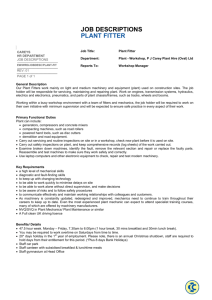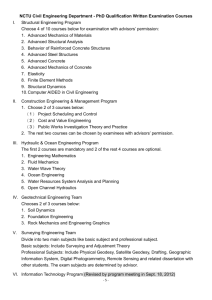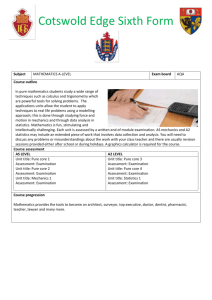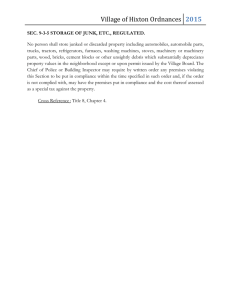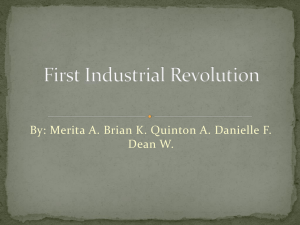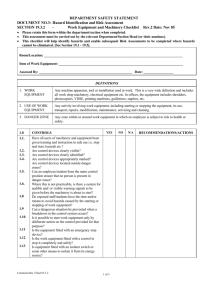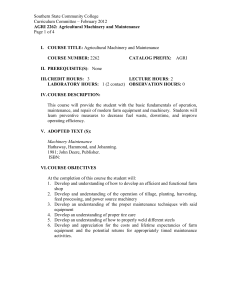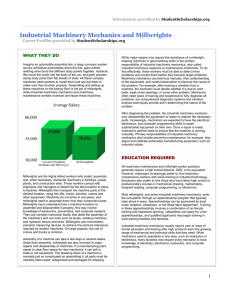0510201W-Mechanisms and Machine Theory
advertisement
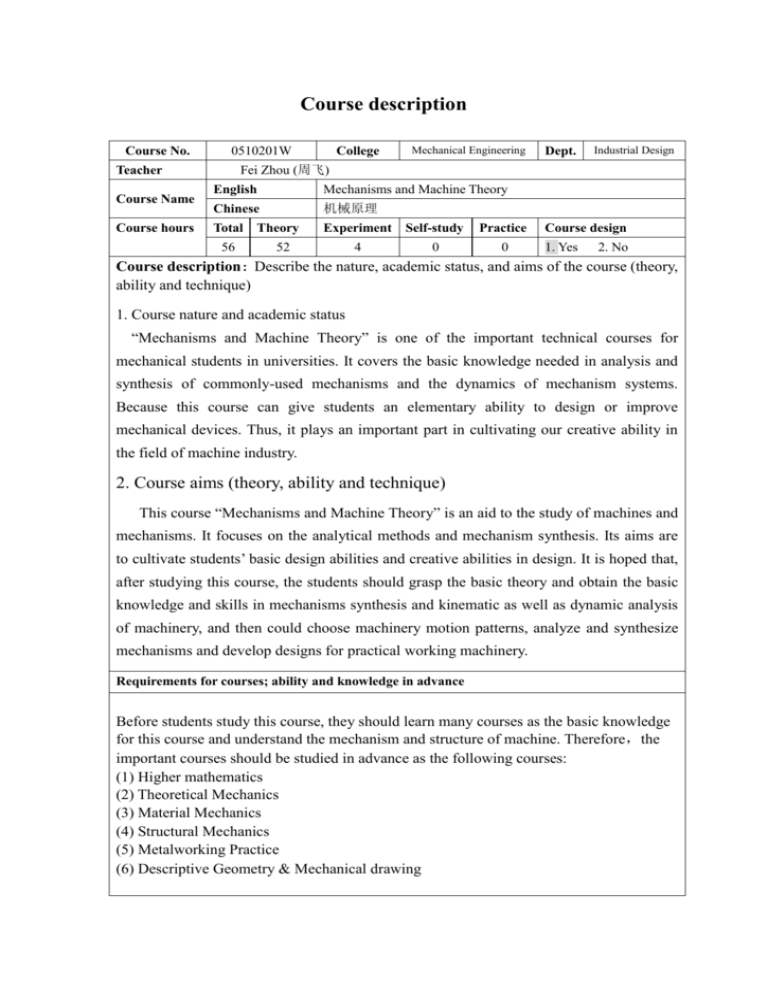
Course description Course No. 0510201W Teacher Course Name Course hours College Mechanical Engineering Dept. Industrial Design Fei Zhou (周飞) English Mechanisms and Machine Theory Chinese 机械原理 Total Experiment Self-study Practice 4 0 0 56 Theory 52 Course design 1. Yes 2. No Course description:Describe the nature, academic status, and aims of the course (theory, ability and technique) 1. Course nature and academic status “Mechanisms and Machine Theory” is one of the important technical courses for mechanical students in universities. It covers the basic knowledge needed in analysis and synthesis of commonly-used mechanisms and the dynamics of mechanism systems. Because this course can give students an elementary ability to design or improve mechanical devices. Thus, it plays an important part in cultivating our creative ability in the field of machine industry. 2. Course aims (theory, ability and technique) This course “Mechanisms and Machine Theory” is an aid to the study of machines and mechanisms. It focuses on the analytical methods and mechanism synthesis. Its aims are to cultivate students’ basic design abilities and creative abilities in design. It is hoped that, after studying this course, the students should grasp the basic theory and obtain the basic knowledge and skills in mechanisms synthesis and kinematic as well as dynamic analysis of machinery, and then could choose machinery motion patterns, analyze and synthesize mechanisms and develop designs for practical working machinery. Requirements for courses; ability and knowledge in advance Before students study this course, they should learn many courses as the basic knowledge for this course and understand the mechanism and structure of machine. Therefore,the important courses should be studied in advance as the following courses: (1) Higher mathematics (2) Theoretical Mechanics (3) Material Mechanics (4) Structural Mechanics (5) Metalworking Practice (6) Descriptive Geometry & Mechanical drawing Course structure explanation: Make clear the necessary parts, optional parts, distribution of hours. Courses with experiments or practice are expected to explain hours needed, content, scheme and functions. The course structure mainly consists of eight parts, which are Introduction(1), Structural analysis of planar mechanisms(2), Kinematic analysis of mechanisms(3), Planar linkage mechanisms(4), Cam mechanisms(5), Gear mechanisms(6), Gear trains(7), Balancing of machinery and Periodic speed fluctuation and its regulation(8). During my teaching, there are two experiments arranged for students, which are the experiment of drawing the schematic mechanisms and design of cam. The distribution of studying hours is shown in Table 1. Table 1. The distribution of hours for parts Parts 1 2 3 4 5 6 7 8 Hour(h) 2 6 4 4 12 14 6 4 Teaching methods (Lectures, practice, etc) The teaching methods mainly consist of lectures, homework and answering questions. According to the quality of homework, the teaching method will be modified to let the foreign students understand the meaning of talks. Forms of examination and requirements Structure of the final grade(including presence, class performance, ), focus of exam, forms of exam(test, interview, final report, etc) The structure of the final grade is composed of the score in normal times and the score of final examination, and their ratio is 1:1. The score in normal times is judged by the presence, class performance, the homework quality and the experimental ability for students, while the score of final examination is decided by the quality of answering questions. If the student’s total score of above two parts is beyond 60, this means that he passes examination. Textbook Name Publisher Author Year Price Mechanism and Machine Theory High Press Ye Zhonghe 2001 13.9 Education Lan Zhaohui M.R. Smith References Name Publisher Author Year Price 机械设计基础 高等教育出版社 黄华梁, 彭文生 2007 29.5 机械设计基础 高等教育出版社 汪信远 2001 15.70 Advanced Mechanism Design Prentice-Hall Int. Inc Erdman AG, 1985 Sandor GN, Website Course members Zhou Fei, College Mechanical Engineering
